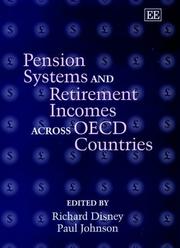| Listing 1 - 10 of 29 | << page >> |
Sort by
|

ISBN: 026204157X 026227177X 0585030960 9780262271776 9780585030968 9780262041577 Year: 1996 Publisher: Cambridge, Mass. MIT Press
Abstract | Keywords | Export | Availability | Bookmark
 Loading...
Loading...Choose an application
- Reference Manager
- EndNote
- RefWorks (Direct export to RefWorks)
The United States Social Security fund is huge and in trouble. The United Kingdom has experimented with the voluntary contracting out of pensions to the private sector. Chile has privatized its public pension system. Australia has adopted a means-tested public pension system. Japan has the earliest retirement age of any advanced economy; it also has the highest rate of labor force participation by elderly men. Can We Afford to Grow Older? provides a comprehensive, up-to-date survey of the implications of population aging in these and other OECD countries relative to a range of specific interrelated issues--Social Security schemes, employer pensions, educational attainment, wage growth and distribution, economic productivity, consumption, savings, retirement, and health care--all within a realistic framework for modeling and discussing policy. International in scope, filled with rich institutional detail, and built on a solid technical foundation, this will be a standard reference on the economic consequences of aging. Richard Disney adopts a "life-cycle" view of the world which recognizes that individuals often make plans with a forward-looking perspective across the stages of childhood, the peak of economic productivity, and retirement. He stresses the existence of overlapping generations and the reality of generational transactions (which include tax and transfer systems, bequests, and charity to the elderly). And he assumes intertemporal optimization as a useful unifying basis for analyzing social security, private pension schemes, lifetime labor-supply decisions, consumption, and saving. Among the surprising conclusions that emerge is that there is no "crisis of aging"--no adverse effect of aging on productivity. And although there are serious crises in pay-as-you-go social insurance programs and in health care, these have little to do with aging. Moreover, the shift in private provision plans away from traditional defined- benefit plans will continue, along with an interest in privatized pensions instead of social security.
Aging --- Older people --- Age distribution (Demography) --- Old age pensions. --- Vieillissement --- Personnes âgées --- Répartition par âge (Démographie) --- Pensions de vieillesse --- Economic aspects. --- Economic conditions --- Aspect économique --- Conditions économiques --- 351.84 --- 314 --- 316 --- #SBIB:316.8H40 --- #SBIB:316.8H14 --- #SBIB:HIVA --- AA / International- internationaal --- 339.320 --- 368.43 --- 332.832 --- 311.94 --- 332.622.1 --- -Aged --- -Age distribution (Demography) --- Old age pensions --- 305.26 --- Employees --- OASI (Old age and survivors insurance) --- Old age and survivors insurance --- Retirement pensions --- Survivors' benefits (Old age pensions) --- Pensions --- Distribution, Age (Demography) --- Age --- Age groups --- Vital statistics --- Population aging --- Aged --- Aging people --- Elderly people --- Old people --- Older adults --- Older persons --- Senior citizens --- Seniors (Older people) --- Persons --- Gerontocracy --- Gerontology --- Old age --- Ageing --- Senescence --- Developmental biology --- Longevity --- Age factors in disease --- Sociaal zekerheidsrecht. Sociaal bestuursrecht. R.S.Z.--(sociale verzekering zie {369}) --- Demografie. Bevolkingsleer --- Sociologie --(algemeen) --- Sociaal beleid: social policy, sociale zekerheid, verzorgingsstaat --- Welzijns- en sociale problemen: bejaarden --- Consumptie: algemeenheden. Wet van de vraag in verband met de consumptie. Consumptiebehoefte. Behoeftetheorie. --- Ouderdomsverzekering. Voorbarige dood. Weduwen en wezen. --- Pensioen. Brugpensioen. --- Verdeling van de bevolking naar leeftijd. Veroudering van de bevolking. --- Werkloosheid volgens leeftijd. Jeugdwerkloosheid. Werkloosheid van oudere werknemers. --- Economic aspects --- Physiological effect --- BUSINESS & ECONOMICS --- Personal Finance / Retirement Planning --- Social Welfare & Social Work --- Social Sciences --- Economic conditions. --- Age distribution (Demography). --- 316 Sociologie --(algemeen) --- 314 Demografie. Bevolkingsleer --- 351.84 Sociaal zekerheidsrecht. Sociaal bestuursrecht. R.S.Z.--(sociale verzekering zie {369}) --- Personnes âgées --- Répartition par âge (Démographie) --- Aspect économique --- Conditions économiques --- Verdeling van de bevolking naar leeftijd. Veroudering van de bevolking --- Werkloosheid volgens leeftijd. Jeugdwerkloosheid. Werkloosheid van oudere werknemers --- Pensioen. Brugpensioen --- Consumptie: algemeenheden. Wet van de vraag in verband met de consumptie. Consumptiebehoefte. Behoeftetheorie --- Ouderdomsverzekering. Voorbarige dood. Weduwen en wezen --- ECONOMICS/Public Economics
Book
ISBN: 1462398308 145272699X 1282106848 1451903189 9786613800190 Year: 2000 Publisher: Washington, D.C. : International Monetary Fund,
Abstract | Keywords | Export | Availability | Bookmark
 Loading...
Loading...Choose an application
- Reference Manager
- EndNote
- RefWorks (Direct export to RefWorks)
The paper provides a selective survey of methods and findings concerning the impact of tax and welfare policies on employment, unemployment, and economic growth in OECD countries. The paper examines a number of facets of tax and welfare policy and concludes that cross-country macroeconomic studies shed only limited light on the issue. Analyses of household behavior using microeconometric methods are much more fruitful but the question remains of how to aggregate these results to assess the overall impact of policy.
Labor --- Macroeconomics --- Taxation --- Wages, Compensation, and Labor Costs: General --- Labor Economics: General --- Demand and Supply of Labor: General --- Taxation, Subsidies, and Revenue: General --- Personal Income and Other Nonbusiness Taxes and Subsidies --- Aggregate Factor Income Distribution --- Labour --- income economics --- Public finance & taxation --- Welfare & benefit systems --- Wages --- Labor supply --- Marginal effective tax rate --- Labor taxes --- Tax policy --- Income --- National accounts --- Labor economics --- Labor market --- Tax administration and procedure --- Income tax --- United Kingdom --- Income economics
Book
Year: 2003 Publisher: Cambridge, Mass. National Bureau of Economic Research
Abstract | Keywords | Export | Availability | Bookmark
 Loading...
Loading...Choose an application
- Reference Manager
- EndNote
- RefWorks (Direct export to RefWorks)
Book
Year: 1994 Publisher: Cambridge, Mass. National Bureau of Economic Research
Abstract | Keywords | Export | Availability | Bookmark
 Loading...
Loading...Choose an application
- Reference Manager
- EndNote
- RefWorks (Direct export to RefWorks)
Digital
Year: 2005 Publisher: Munich CESifo
Abstract | Keywords | Export | Availability | Bookmark
 Loading...
Loading...Choose an application
- Reference Manager
- EndNote
- RefWorks (Direct export to RefWorks)
Book
ISBN: 0905492781 Year: 1992 Publisher: London : Anglo-German Foundation for the Study of Industrial Society,
Abstract | Keywords | Export | Availability | Bookmark
 Loading...
Loading...Choose an application
- Reference Manager
- EndNote
- RefWorks (Direct export to RefWorks)
Manpower policy --- Unemployment --- Emploi --- Chômage --- Government policy --- Politique gouvernementale
Article
Abstract | Keywords | Export | Availability | Bookmark
 Loading...
Loading...Choose an application
- Reference Manager
- EndNote
- RefWorks (Direct export to RefWorks)

ISBN: 0198772270 0198772289 9780198772279 Year: 1985 Publisher: Oxford Clarendon
Abstract | Keywords | Export | Availability | Bookmark
 Loading...
Loading...Choose an application
- Reference Manager
- EndNote
- RefWorks (Direct export to RefWorks)
Economic analysis of law --- Social security law --- Great Britain --- Social security --- 36(41) --- -#SBIB:HIVA --- #SBIB:316.8H40 --- Insurance, Social --- Insurance, State and compulsory --- Social insurance --- Insurance --- Income maintenance programs --- Maatschappelijk werk--Verenigd Koninkrijk van Groot-Brittannië en Noord-Ierland --- Sociaal beleid: social policy, sociale zekerheid, verzorgingsstaat --- 36(41) Maatschappelijk werk--Verenigd Koninkrijk van Groot-Brittannië en Noord-Ierland --- -Insurance, Social --- Social security - Great Britain

ISBN: 1840645636 9781840645637 Year: 2001 Publisher: Cheltenham : Edward Elgar,
Abstract | Keywords | Export | Availability | Bookmark
 Loading...
Loading...Choose an application
- Reference Manager
- EndNote
- RefWorks (Direct export to RefWorks)
Old age pensions --- Pensions --- Social security --- Older people --- Retirement income --- Economic conditions --- 658.313 --- #SBIB:022.IO --- #SBIB:316.8H40 --- #SBIB:35H437 --- pensioen --- sociale zekerheid --- 331.252091821 --- Aged --- -Old age pensions --- -Pensions --- -Social security --- -Aged --- -Retirement income --- -Income --- Aging people --- Elderly people --- Old people --- Older adults --- Older persons --- Senior citizens --- Seniors (Older people) --- Age groups --- Persons --- Gerontocracy --- Gerontology --- Old age --- Insurance, Social --- Insurance, State and compulsory --- Social insurance --- Insurance --- Income maintenance programs --- Compensation --- Pension plans --- Retirement pensions --- Superannuation --- Annuities --- Social security individual investment accounts --- Vested benefits --- Employees --- OASI (Old age and survivors insurance) --- Old age and survivors insurance --- Survivors' benefits (Old age pensions) --- Dismissal, resignation, reinstatement etc. --- Sociaal beleid: social policy, sociale zekerheid, verzorgingsstaat --- Beleidssectoren: sociale zekerheid --- -Economic conditions --- 658.313 Dismissal, resignation, reinstatement etc. --- -Dismissal, resignation, reinstatement etc. --- -658.313 --- -Compensation --- Income --- Dismissal, resignation, reinstatement etc --- Old age pensions - OECD countries - Case studies - Congresses --- Pensions - OECD countries - Case studies - Congresses --- Social security - OECD countries - Case studies - Congresses --- Older people - OECD countries - Economic conditions - Statistics - Congresses --- Retirement income - OECD countries - Statistics - Congresses
Digital
Year: 2012 Publisher: Cambridge, Mass. National Bureau of Economic Research
Abstract | Keywords | Export | Availability | Bookmark
 Loading...
Loading...Choose an application
- Reference Manager
- EndNote
- RefWorks (Direct export to RefWorks)
We examine the ill-health retirement of police officers in the forces of England and Wales between 2002-03 and 2009-10. Differences in ill-health retirement rates across forces are statistically related to area-specific stresses of policing and force-specific differences in human resources policies. Reforms to police pension plans – in particular a shift in the incidence of financing ill-health retirement from central government to local police authorities – occurred in the mid-2000s. We show these measures impacted on the level of ill-health retirement, especially on forces with above-average rates of retirement. We find that residual differences in post-2006 ill-health retirement rates across forces are related to their differential capacities to raise revenue from local property taxes.
| Listing 1 - 10 of 29 | << page >> |
Sort by
|

 Search
Search Feedback
Feedback About UniCat
About UniCat  Help
Help News
News